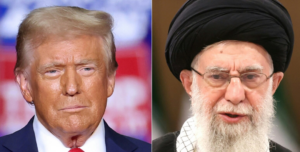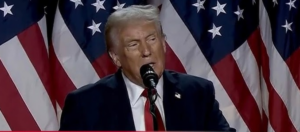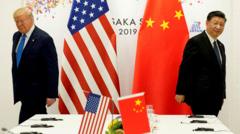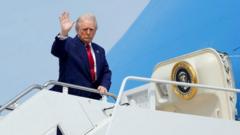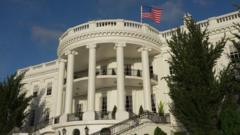This comes after years of strained relations and past failed negotiations, with both countries seeking a resolution to avoid further conflict.
US and Iran Engage in High-Stakes Nuclear Negotiations, Trump Reveals

US and Iran Engage in High-Stakes Nuclear Negotiations, Trump Reveals
Amid escalating tensions, the US and Iran are initiating direct talks to potentially resolve nuclear concerns.
The United States and Iran are reportedly engaged in "direct talks" aimed at reviving negotiations concerning Iran's nuclear program, as disclosed by President Donald Trump on Monday. The discussions, set for Saturday, involve high-level officials and carry significant implications for regional security. Trump warned of severe consequences for Iran if negotiations fail, emphasizing the need to prevent the country from acquiring nuclear weapons.
The announcement followed a meeting at the White House between Trump and Israeli Prime Minister Benjamin Netanyahu, who expressed concerns about Iran's nuclear capabilities. Trump referenced a "very big meeting on Saturday" and appeared optimistic about a potential deal, stating, “Maybe a deal is going to be made; that would be great.” He added that if the talks were unproductive, Iran would find itself in "great danger."
Though Trump did not divulge specifics regarding the discussions or the officials involved, Iranian Foreign Minister Abbas Araqchi pointed out that while Iran favors diplomacy, it prefers indirect communications. Araqchi indicated that, to date, no formal negotiations have taken place between the two nations, which have lacked diplomatic ties since 1980.
Previously, in March, Trump attempted to reach out to Iran through a letter sent via a mediator from the UAE, which Iran declined, although it indicated a willingness to negotiate through a third party. The aim to limit Iran’s nuclear program has been a longstanding foreign policy objective for the US and its allies.
In 2015, President Barack Obama facilitated a landmark agreement that required Iran to curb its nuclear activities in exchange for relief from crippling sanctions. However, Trump later abandoned the deal in 2016, escalating tensions and prompting Iran to breach its commitments in subsequent years. Recent reports from the International Atomic Energy Agency revealed that Iran has significantly increased its stockpiles of enriched uranium, raising alarms over its nuclear intentions.
In light of ongoing conflicts, Israel's strategic stance sees preventing Iran from developing nuclear weapons as crucial to its national security. The Israeli government has suggested the possibility of military action against Iran's nuclear facilities, a prospect underscored by their recent attacks in response to Iranian aggression.
Netanyahu, mirrored sentiments with Trump, stating, “We and the United States are both united in the goal that Iran does not ever get nuclear weapons.” He further expressed a preference for diplomatic solutions akin to those utilized in negotiations with Libya. As talks progress, both nations face immense pressure from international and domestic fronts, making the outcome of these negotiations pivotal to future relations and regional stability.
The announcement followed a meeting at the White House between Trump and Israeli Prime Minister Benjamin Netanyahu, who expressed concerns about Iran's nuclear capabilities. Trump referenced a "very big meeting on Saturday" and appeared optimistic about a potential deal, stating, “Maybe a deal is going to be made; that would be great.” He added that if the talks were unproductive, Iran would find itself in "great danger."
Though Trump did not divulge specifics regarding the discussions or the officials involved, Iranian Foreign Minister Abbas Araqchi pointed out that while Iran favors diplomacy, it prefers indirect communications. Araqchi indicated that, to date, no formal negotiations have taken place between the two nations, which have lacked diplomatic ties since 1980.
Previously, in March, Trump attempted to reach out to Iran through a letter sent via a mediator from the UAE, which Iran declined, although it indicated a willingness to negotiate through a third party. The aim to limit Iran’s nuclear program has been a longstanding foreign policy objective for the US and its allies.
In 2015, President Barack Obama facilitated a landmark agreement that required Iran to curb its nuclear activities in exchange for relief from crippling sanctions. However, Trump later abandoned the deal in 2016, escalating tensions and prompting Iran to breach its commitments in subsequent years. Recent reports from the International Atomic Energy Agency revealed that Iran has significantly increased its stockpiles of enriched uranium, raising alarms over its nuclear intentions.
In light of ongoing conflicts, Israel's strategic stance sees preventing Iran from developing nuclear weapons as crucial to its national security. The Israeli government has suggested the possibility of military action against Iran's nuclear facilities, a prospect underscored by their recent attacks in response to Iranian aggression.
Netanyahu, mirrored sentiments with Trump, stating, “We and the United States are both united in the goal that Iran does not ever get nuclear weapons.” He further expressed a preference for diplomatic solutions akin to those utilized in negotiations with Libya. As talks progress, both nations face immense pressure from international and domestic fronts, making the outcome of these negotiations pivotal to future relations and regional stability.




